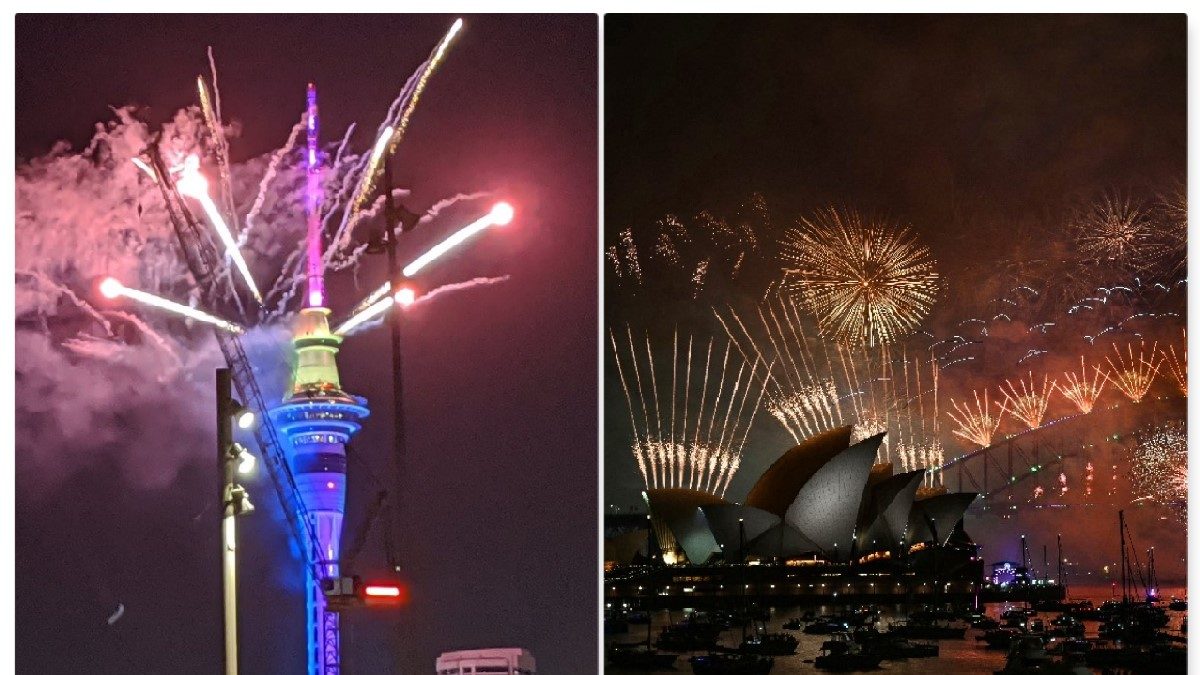Last Updated:
New Year 2025 has already arrived in some countries like New Zealand and Australia with a gleaming display of fireworks and festivities as the clock struck midnight.

Happy New Year 2025: Festivities erupt in Auckland and Sydney as the cities welcomed 2025.
The bells of the New Year 2025 rang loudly and festivities hung in the air as people bid farewell to the year 2024 with dazzling fireworks displays and more after a year marred by conflicts and economic woes.
Kiritimati (Christmas Island), located in the small Pacific Island nation of Kiribati, was the first place to celebrate the new year, followed by the Chatam Islands in New Zealand.
A dazzling fireworks display was seen New Zealand’s Auckland, which was the first major city to welcome 2025, followed by Fiji, the first country. People celebrated on the streets of key Australian cities of Melbourne, Sydney and Canberra to welcome the new year with grace and jubilation.
Sydney, known as the “New Year’s capital of the world” sprayed tonnes of fireworks from its famed Opera House and Harbour Bridge at midnight to a crowd of a million spectators.
The arrival of the New Year comes with a vibrant mix of traditions and diverse cultural expressions with parties of grandeur, firework displays and prayers to mark another year hopeful of happiness, prosperity and success.
2024: A Year Of Political Turmoil
People would be eagerly waiting for 2025 as the outgoing year saw deep political turmoil across the world, with two wars in Ukraine and Gaza, climate-fueled disasters and armed rebellions in several years, the latest being Syria.
The year marked elections in more than 60 countries, which means that half of the world’s population went to polls in 2024. Russian President Vladimir Putin secured a sixth term in an election widely described as a sham and Indian Prime Minister Narendra Modi secured a historic third term in the Parliament.
However, no election was as closely watched as the one in the United States, where Donald Trump upstaged his Democrat rival Kamala Harris to become the first President to serve non-consecutive terms in over a century. While he is yet to take office, his position on immigration and foreign policy have already sent shockwaves.
On the other hand, Bangladesh PM Sheikh Hasina was ousted from power in an unprecedented student-led protest movement that swelled into an anti-government agitation, bringing an end to her 14-year rule in the country and throwing Asian politics in an era of uncertainty with a growing Islamist shift in Dhaka.
Furthermore, Syrian President Bashar al-Assad’s over two-decade rule came to a violent conclusion as rebel forces led by Hayat Tahrir al-Sham (HTS) launched a lightning offensive in December to snatch power, ending the Assad family’s reign of over 50 years.
Wars continued in Ukraine and Gaza, with a daring campaign against Hezbollah through doctored explosions in a wave of assassinations targeting the Lebanon-based Hezbollah group. Throughout its campaign in 2024, Israel notched up significant victories with the death of Hamas chief Ismail Haniyeh and Hezbollah chief Hassan Nasrallah, dealing a critical blow to Iran’s ‘Axis of Resistance’.
How Inflation Impacted Geopolitics In 2024?
2024 was a year of anti-incumbency, except India, fuelled by a hefty increase in prices for household items to energy over the past few years. The British put an end to 14-year Conservative rule by electing Labour PM Keir Starmer in July. The inflation-driven anti-incumbent sentiment also ushered in new governments in Britain and Botswana, Portugal and Panama.
South Korean voters also put the opposition into power in its parliament, a check on President Yoon Suk Yeol due to a rising cost of living. In early December, the president imposed martial law, a move the National Assembly quickly reversed.
In business, companies around the world grappled with how to adapt to artificial intelligence. The dominance of tech companies for investors can be summed up in this simple fact: seven tech firms — the so-called Magnificent Seven — now account for more than one-third of the S&P 500’s market cap.
What Next In 2025?
Alas, there is no one way of answering this question due to the unfamiliar terrain of contemporary geopolitics. The Russia-Ukraine war nears a grim three-year anniversary in February, while civilians grow weary of the grinding war in Gaza, where more than 45,000 Palestinians have already been killed.
However, US President-elect Donald Trump has promised to bring an end to the war in Ukraine within a single day, although uncertainties prevail on how he would do it. There was also hope and trepidation as the new year approached in Syria following Bashar al-Assad’s ouster.
In the new year, we can expect Artificial Intelligence (AI) to dominate public discourse. Rampant inflation is also tipped to slow in the upcoming year. The combination of tech companies and political power, given Elon Musk’s close ties with Trump, could also define 2025.
Some 400 million pilgrims are expected at the spectacular Kumbh Mela festival in Uttar Pradesh’s Prayagraj – billed as the largest gathering of humanity on the planet. India will also hold elections in two important states.
People are also looking forward to numerous sports events – like the ICC Champions Trophy and the 32-team US Club World Cup. India will host the 2025 Kabaddi World Cup. In entertainment, Britpop bad boys Oasis will make a long-awaited reunion, while K-pop megastars BTS return to the stage after military service in South Korea.
The UK weather service has already forecast sweltering global temperatures for 2025, suggesting it is likely to rank among the hottest years recorded. But with electric vehicle sales growing and renewable energy on the rise, there is a shred of hope that glacial progress on climate change may finally gain momentum.
(with agency inputs)
- Location :
Sydney, Australia


